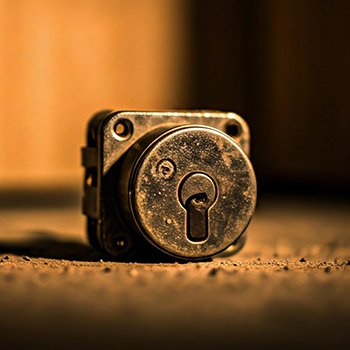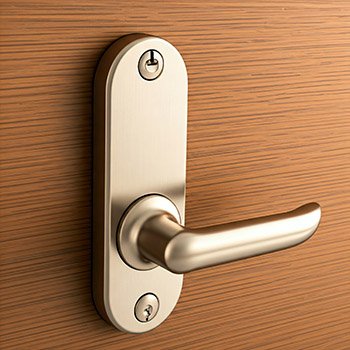 Replacing door locks is crucial for ensuring your home’s security, but it’s not always easy to know when the time has come to make the change. Whether you’re moving into a new home, dealing with faulty locks, or simply looking to upgrade your security, knowing the signs that indicate it’s time for a replacement can help you protect your property and loved ones. This guide will walk you through when to replace your locks, what factors to consider, and how to select the best locks to suit your needs.
Replacing door locks is crucial for ensuring your home’s security, but it’s not always easy to know when the time has come to make the change. Whether you’re moving into a new home, dealing with faulty locks, or simply looking to upgrade your security, knowing the signs that indicate it’s time for a replacement can help you protect your property and loved ones. This guide will walk you through when to replace your locks, what factors to consider, and how to select the best locks to suit your needs.
While many homeowners wait until their locks are broken or malfunctioning, proactive replacement is always a better approach to ensure continuous security. Below are the key moments when you should consider replacing your locks:
- After Moving into a New Home
Changing the locks when you move into a new home is one of the first steps in securing your new property. Even if the previous owners seem trustworthy, there’s no way to know how many spare keys they may have distributed to neighbors, friends, or contractors. Real estate agents, cleaning crews, and even maintenance workers often have copies of the keys, potentially leaving your home vulnerable to unauthorized access. By changing the locks, you regain control over who can enter your home. It’s a relatively simple and cost-effective way to give you peace of mind and eliminate the risk of unwanted visitors.
- Signs of Wear and Tear
Locks, especially those exposed to the elements, can show visible signs of wear and tear over time. Rust, corrosion, or damage from weather conditions can weaken the internal mechanisms of the lock, making it more susceptible to break-ins. Regularly inspect the lock for these signs to ensure it still works effectively.
If you notice that the key is hard to turn, or if the door doesn’t lock or unlock smoothly, these are clear indicators of internal damage. It’s better to replace the lock before it fails completely and compromises your home’s security.
- Difficulty Operating the Lock
If you’re struggling to operate the lock—whether it’s hard to insert the key, the key turns with resistance, or the door feels loose even when the lock is engaged—it may be time for a replacement. These issues are often caused by internal wear, misalignment, or mechanical failure, all of which can prevent the lock from functioning properly.
Locks that require excessive force to operate may also become easier for burglars to tamper with, putting your home at greater risk. It’s crucial to replace malfunctioning locks promptly to avoid potential security breaches.
- Repeated Lockouts
If you find yourself locked out of your home often due to malfunctioning locks, it may indicate that the lock mechanism is failing. Even if you manage to unlock it eventually, continued lockouts can be frustrating and time-consuming. A replacement lock will restore your ability to lock and unlock your door without hassle and enhance your overall security.
- Lost or Stolen Keys
If your keys are lost or stolen, it’s highly recommended that you replace your locks. Even if you’re unsure whether someone has made a copy of your keys, there’s no guarantee that the person who found or took your keys won’t attempt to access your home. Replacing the locks will give you complete control over who has access to your property, mitigating the risks associated with misplaced or stolen keys.
- After a Break-In or Attempted Break-In
If your home has been broken into or even targeted in a break-in attempt, it’s crucial to replace your locks. Even if the locks weren’t damaged during the incident, they may no longer offer the same level of security. Intruders may have found ways to bypass the lock, or they might have left behind tools that could make it easier for them to return.
Replacing your locks after a break-in ensures that your home remains secure and that you’re not leaving any vulnerabilities for future attempts. You should also consider upgrading to stronger, more secure locks, especially if your current locks were easily compromised.
How Often Should You Check the Condition of Your Door Locks?
While you may not need to replace your locks frequently, it’s important to inspect them regularly to ensure they remain in good condition. Ideally, you should check the condition of your door locks at least once a year. During these checks, look for the following:
– Physical damage: Rust, corrosion, or cracks can indicate the need for replacement.
– Wear and tear: If the lock feels loose, has trouble engaging, or doesn’t turn smoothly, it’s time to act.
– Strange sounds: Grinding or clicking noises when locking or unlocking may suggest internal problems.
Checking your locks regularly will allow you to identify potential issues before they become serious security risks. If you’re unsure about the condition of your locks, it’s always a good idea to consult a professional locksmith who can evaluate their functionality and recommend repairs or replacements.
How Long Do Door Locks Typically Last?
 The lifespan of a door lock depends on several factors, including the quality of the lock, the frequency of use, and the environment in which it’s used. On average, locks can last between 7 to 10 years, with some high-quality locks lasting even longer. If your locks are approaching the 7-10 year mark, it’s a good idea to have them inspected, even if they’re still functioning properly. Over time, wear and tear can affect their reliability, so it’s important to keep an eye out for any signs of malfunction.
The lifespan of a door lock depends on several factors, including the quality of the lock, the frequency of use, and the environment in which it’s used. On average, locks can last between 7 to 10 years, with some high-quality locks lasting even longer. If your locks are approaching the 7-10 year mark, it’s a good idea to have them inspected, even if they’re still functioning properly. Over time, wear and tear can affect their reliability, so it’s important to keep an eye out for any signs of malfunction.
If you live in an area with extreme weather conditions, like heavy rain or humidity, the lifespan of your locks may be shorter, especially if they’re not made from weather-resistant materials. Regular maintenance and prompt replacement when needed will help ensure your home’s security isn’t compromised.
Factors to Consider When Replacing Locks
When it comes to replacing locks, there are several factors you should consider to ensure you’re choosing the right lock for your needs:
- Security Level
If your current locks are outdated or easily bypassed, upgrading to a more secure lock is essential. Deadbolts are a popular option, as they provide superior protection compared to standard knob locks. You may also want to consider high-security locks, which offer additional features to prevent tampering and unauthorized access.
- Type of Lock
There are various types of locks available, each suited for different needs. Common options include:
– Deadbolt locks: These provide a high level of security and are ideal for exterior doors.
– Smart locks: These offer keyless entry, remote access, and monitoring capabilities, making them convenient for tech-savvy homeowners.
– Electronic locks: These may include features like keypad entry, fingerprint recognition, or remote access, providing an advanced level of security.
– Padlocks: Used for gates, sheds, or secondary doors, they offer flexibility but may not provide the same security level as deadbolts.
Choose a lock that aligns with your security needs and the level of convenience you prefer.
- Budget
Locks come in a wide range of prices, so it’s important to set a budget before making a decision (see our guide for lock replacements and upgrades). While high-security locks and smart locks tend to be more expensive, they offer greater protection and convenience. If you have a limited budget, look for durable, basic locks that still provide a high level of security.
- Installation Requirements
Some locks, particularly smart or electronic models, may require professional installation. Consider the cost of installation when choosing a lock, especially if you’re opting for a more advanced model. For basic locks, you may be able to install them yourself, but for more complex systems, professional help will ensure proper installation and functionality.
- Aesthetic Considerations
Especially for exterior doors, the appearance of your lock should complement your home’s design. While security is the top priority, you’ll also want a lock that fits well with the aesthetic of your front door. Choose a lock that enhances your home’s curb appeal while offering the protection you need.
Conclusion
Replacing door locks is an essential part of maintaining your home’s security. Whether you’re moving into a new home, dealing with worn-out locks, or simply looking to upgrade your security, being proactive about replacing locks will provide peace of mind and protect your home from potential threats.
Look for the signs that indicate it’s time for a replacement, such as visible damage, difficulty operating the lock, or frequent lockouts. When choosing new locks, consider factors like security level, lock type, budget, and installation requirements to find the best option for your needs. Investing in high-quality, reliable locks will help safeguard your home and ensure the safety of your family for years to come.
